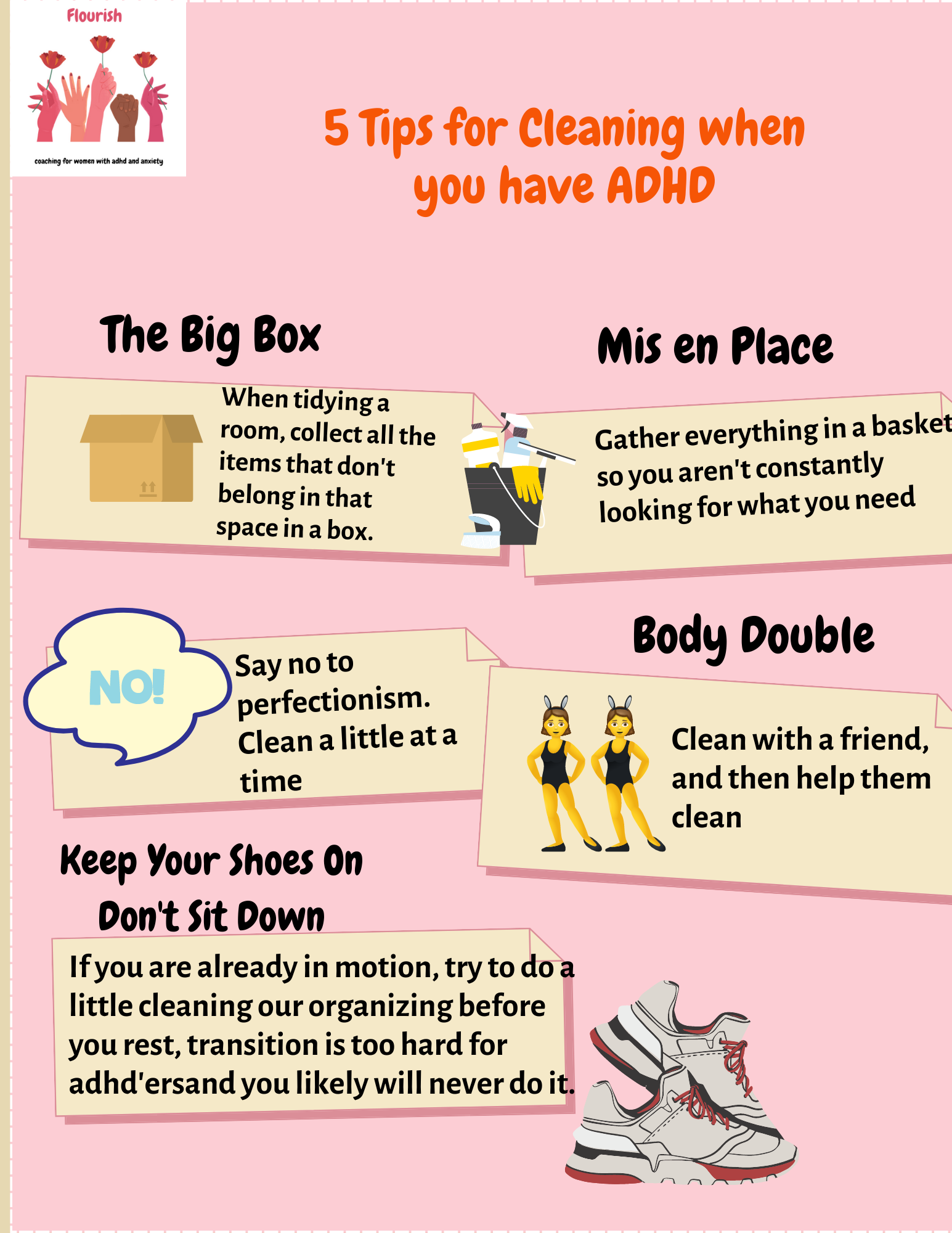
Executive Functioning and ADHD Tips for Women
Are you struggling to keep track of your tasks, manage your time, or stay focused on long-term goals? If so, you might be experiencing executive dysfunction, a common challenge for individuals with ADHD. Let's delve into what this means and explore some executive functioning and adhd tips for women in this post.
What is Executive Functioning? 🧠
Executive functions are crucial cognitive processes for managing daily tasks and achieving goals. Women with ADHD often face unique challenges in these areas, experiencing varying levels of difficulty. Understanding these functions is essential for developing effective strategies to manage ADHD.
Key Components of Executive Functions
- Planning 📝: The ability to set goals and outline the steps needed to achieve them.
- Time Management ⏳: Gauging available time, allocating it efficiently, and adhering to deadlines.
- Prioritizing 🎯: Deciding which tasks are most important and focusing on them.
- Organizing 📚: Systematically arranging thoughts, tasks, or items.
- Decision Making 🤔: Making informed choices among various options.
- Behavioral Inhibition 🚦: Resisting impulses and avoiding potentially harmful behaviors.
- Concentration 🔍: Maintaining focus on a task despite distractions.
- Memory 💡: Retaining and recalling information, following directions, and paying attention to details.
- Task Shifting 🔄: Smoothly transitioning from one activity to another.
- Metacognition and Self-awareness 🧩: Reflecting on one’s actions and learning from experiences.
- Emotional Regulation ❤️: Managing emotional responses effectively.
Executive Functioning and ADHD Tips for Women
1. Externalizing Information 🗂️
Use tools like sticky notes, planners, and digital reminders to keep important information visible and accessible. This strategy helps reduce the reliance on memory and provides clear visual cues for tracking tasks and responsibilities. It can also help you to prioritize.
2. Making Time Physical 🕰️
Utilize physical tools such as timers, clocks, or visual schedules to make the passage of time more tangible. This aids in better time management by making it easier to adhere to schedules and deadlines.
3. Breaking Tasks into Smaller Steps 🧩
Dividing larger tasks into smaller, manageable steps prevents feeling overwhelmed and facilitates task initiation. This approach also provides immediate feedback and a sense of progress.
4. Using External Motivation 🎉
External motivators, such as rewards or accountability systems, can be crucial for individuals with ADHD. These strategies help maintain focus and commitment, particularly for tasks that may not be inherently engaging.
5. Relying on Physical Problem-Solving Aids 🛠️
Using tools like paper, pens, or physical objects can help make abstract challenges more concrete. This hands-on approach aids in visualizing solutions and effectively working through problems.
6. Rest and Refill Your Executive Functioning🍏
Engage in activities that replenish cognitive resources, such as adequate sleep, nutritious meals, regular exercise, and scheduled breaks. Maintaining a healthy lifestyle is crucial for optimal executive functioning.
7. Implementing Routines and Automating Tasks 🔄
Establish consistent routines and automate repetitive tasks to reduce cognitive load. Use apps and devices to automate reminders and manage daily responsibilities efficiently. A balance of structure and freedom can be good for your brain.
8. Prioritizing and Setting Limits and Boundaries🚫
Set realistic goals and focus on the most critical tasks each day. Avoid overloading to-do lists to maintain focus and productivity.
9. Tackling Difficult Tasks First 💪
Address the most challenging tasks first to free up mental energy for other responsibilities. This strategy helps reduce procrastination and anxiety about unfinished tasks.
10. Using Planners and Calendars 📅
Planners and calendars are essential for organizing tasks, deadlines, and appointments. Select tools that suit your preferences to enhance time management and organization. Having a schedule reduces stress.
11. Energy Management 💡
Schedule cognitively demanding tasks for times when your energy levels are highest, such as after exercise or when ADHD medication is most effective. This might mean in the morning if you are an early bird or at night if you are a night owl.
For women, this also entails tracking their cycles. This schedule might consist of having a calendar on the wall with two or three colors: red, green, and yellow. This sort of monthly structure maximizes productivity and focus. During certain times of your cycle, you may experience impulsivity, exhaustion, or energy. Knowing when these are helps tremendously.
12. Cutting Down on “Noise” and Friction 🔇
Minimize distractions by setting up environments that reduce temptations and unnecessary stimuli, such as using internet blockers or silencing notifications.You don't need to depend on will power. Make the easy things that are temptations hard to do and the hard things that you want to do easy to do.
13. Creating Artificial Consequences ⚖️
Set up immediate and specific consequences for completing or delaying tasks. This might involve regular check-ins with a supervisor or an accountability partner. Note: For Some this helpful and for others this isn't.
14. Reducing Stress and Chaos 🌿
A chaotic environment can exacerbate executive dysfunction. Establishing routines and maintaining a structured environment helps manage stress and focus on essential tasks.
15. Maintaining Motivation by Enjoying the Journey 🌈
Sustain motivation by making tasks enjoyable and rewarding yourself for progress. This positive reinforcement helps maintain a healthy outlook and reinforces good habits.
Understanding the Interest-Based Nervous System in ADHD. Executive Functioning and ADHD Tips that Consider Your Neurotype.
The concept of an interest-based nervous system is key to understanding the unique motivational landscape of people with ADHD. Unlike the neurotypical population, people with ADHD often find it challenging to engage with tasks that are not inherently interesting or stimulating. This can lead to difficulties in areas requiring sustained attention and effort, especially if the task lacks immediate rewards or personal relevance. Often adhd people need more flexibility in how they approach life and think of themselves. This will help tremendously with a sense of happiness and productivity, but on the things that feel valuable and important.
How the Interest-Based Nervous System Affects Executive Functioning
- Selective Attention: People with ADHD may have a heightened ability to focus intensely on tasks that capture their interest, often referred to as "hyperfocus." However, tasks that are not engaging may be difficult to start or sustain.
- Motivation and Task Initiation: Traditional motivators, like deadlines or external pressure, might not be as effective for those with an interest-based nervous system. Instead, passion-driven goals or curiosity can serve as powerful motivators.
- Strategies to Leverage Interests:
- Align Tasks with Interests: Whenever possible, align tasks with personal interests. This could involve choosing career paths, hobbies, or daily tasks that engage and excite you.
- Use Interest as a Reward: Pair less interesting tasks with more engaging ones as a reward. For example, use time on a favorite hobby as a reward for completing necessary but less engaging tasks.
- Find the Intrinsic Value: Discovering a personal connection or intrinsic value in a task can help sustain motivation. This might involve reframing the task to highlight its importance or relevance to personal goals.
Understanding and leveraging an interest-based nervous system can be crucial in managing executive dysfunction for women with ADHD. By aligning tasks with personal interests and finding ways to make less engaging tasks more appealing, individuals can improve focus, motivation, and overall executive functioning.
Neurodivergent-Affirming Strategies for Women with ADHD
Traditional approaches often pathologize the experiences of women with ADHD, overlooking factors like stress, trauma, sensory responses, and shame. A neurodivergent-affirming approach focuses on leveraging the brain's unique strengths, emphasizing self-accommodation, self-compassion, and self-advocacy.
Key Strategies Include:
- Self-Accommodation 🛋️: Modify environments and tasks to align with your strengths and needs.
- Self-Compassion and Self-Advocacy 💖: Encourage understanding and advocate for your needs in various settings.
- Somatic, Strengths, and Values Work 🌿: Engage in practices that enhance body awareness, leverage personal strengths, and align with core values.
This approach helps set realistic goals and expectations, reducing unnecessary stress and fostering well-being and personal growth. By affirming neurodivergent identities, individuals can cultivate a supportive environment that enhances executive functioning.
Additional Strategies and Executive Functioning and ADHD Tips for women
Optimizing Work Performance
- Simplify: Break down complex activities into simple, manageable steps. Check them off as they are completed.
- Routinize: Develop Standard Operating Procedures (SOPs) for tasks, including step-by-step instructions and necessary materials.
- Organize: Structure your day, week, and month using calendars or scheduling apps. Keep your work area uncluttered.
Note: Organization systems can be deeply personal, so make note of what works for you.
Memory Enhancement Techniques
- Rehearse/Practice: Use repeated learning trials to better encode information.
- Chunking: Organize information into meaningful associations for easier recall.
- Verbalizing and Visualizing: Convert visual material into words and create mental images for verbal information.
- Mnemonics and Flash Cards: Use mnemonic devices like acronyms or create flashcards for quick review.
- Memory Journal: Maintain a journal for continuous information tracking.
Cognitive Behavioral Therapy (CBT) and Skill-Based Coaching
Cognitive Behavioral Therapy (CBT) is a commonly recommended approach for managing ADHD and executive dysfunction. It helps individuals develop strategies for inhibition, emotion regulation, time management, and planning by addressing underlying thought patterns and behaviors. However, it's important to note that many neurodivergent women may find traditional behavioral modification techniques, often associated with CBT, less appealing or effective. This discomfort arises from the focus on changing behavior to conform to neurotypical standards, which can sometimes overlook the unique needs and experiences of neurodivergent individuals.
Instead, Skill-Based Coaching is often a more preferred and effective approach for many women with ADHD. This form of coaching focuses on practical skill-building, such as organizing, time management, and prioritization, tailored to the individual's strengths and challenges. It provides a supportive environment where women can learn to manage their symptoms in ways that align with their personal values and lifestyle, promoting empowerment and self-efficacy.
Support Systems and Community Resources
Online and in-person support groups can connect parents and adults with others facing similar challenges, allowing them to share practical strategies.
FAQs
1. What are the key executive functions impacted by ADHD?
- ADHD can affect key executive functions such as planning, prioritizing, time management, prioritizing, organizing, decision-making, behavioral inhibition, concentration, memory, task shifting, metacognition, and emotional regulation.
2. How does externalizing information assist with executive dysfunction?
- Externalizing information through tools like sticky notes or digital reminders helps reduce the reliance on working memory, providing clear visual cues that make managing daily activities more straightforward and can help with organization of your thoughts and activities.
3. What is a neurodivergent-affirming approach, and why is it important?
- A neurodivergent-affirming approach recognizes and respects the unique strengths and challenges of neurodivergent individuals, focusing on self-accommodation, self-compassion, and self-advocacy rather than attempting to conform to neurotypical norms. There is more flexibility, and it focuses less on productivity and more on strengths.
4. How does skill-based coaching differ from traditional CBT in managing ADHD?
- While CBT focuses on modifying behaviors and thought patterns, skill-based coaching emphasizes practical skill-building tailored to the individual's strengths and challenges. This approach can be more effective, provides more flexibility, and is preferred by many neurodivergent women.
5. Why are support systems crucial for women with ADHD?
- Support systems, including support groups and community resources, provide essential emotional support, practical advice, and a sense of community, helping individuals manage the challenges of ADHD and executive dysfunction more effectively.
Conclusion 🌟
Managing executive dysfunction in adult women with ADHD involves a combination of practical strategies and a supportive growth mindset. By understanding and implementing executive functioning and ADHD tips like externalizing critical information, breaking tasks into smaller steps, and utilizing skill-based coaching, individuals can significantly enhance their executive functioning skills. Embracing a neurodivergent-affirming approach, strong support systems, and professional guidance is crucial for a comprehensive and empowering approach to ADHD management. Women with ADHD can thrive by recognizing their unique strengths and accessing the resources available to support their journey.
Leave executive functioning and ADHD tips for these pages
How does Gender impact executive Functions?



